Metody finansowania kościoła katolickiego w Rosji w XIX wieku. Przyczynek archiwalny
Methods of financing the Catholic Church in Russia in the nineteenth century. An archival supplement
Author(s): Irena Wodzianowska, Marian RadwanSubject(s): Christian Theology and Religion, History, Law, Constitution, Jurisprudence, Theology and Religion
Published by: Katolicki Uniwersytet Lubelski Jana Pawła II - Wydział Teologii
Keywords: the Roman-Catholic College; Department of Foreign Confessions of the Ministry of the Interior; assistance fund; theological seminaries; Theological Academy; Caesaropapism; Slavophilism; the dissolutio
Summary/Abstract: The religious policy of the Russian State was inspired by two ideological trends, which were rooted in the tradition of Peter I and Catherine II - Caesaropapism and Slavophilism. Russian rulers sought to subjugate the religious denominations, and also to build a Pan-Slavic empire with the Russian language. With regard to the Catholic Church, those demands proved to be extremely valid as 60% of the lands of the Polish Republic became part of Russia after the partitions. The tsarist authorities tried to separate Catholics from the Holy See and impose gradually the Russian language and culture on them. Secular authorities wanted to gain control over church institutions - dioceses, seminaries, parishes, monasteries. To achieve that aim, the authorities established the Roman-Catholic College (1801), and subordinated it directly to the Ministry of the Interior. Both organizations exercised full control over ecclesiastical institutions. Lay prosecutors in both of those offices played a decisive role.At the command of the tsarist regime all the monastic, diocesan and parish properties were gradually taken over, in return certain salaries (1832.1843) were granted to them. On the other hand, at the initiative of Metropolitan Bishop Siestrzeńcewicz S. (1820) so-called assistance fund was created, the aim of which was to finance the special expenses - poor parishes, seminars, Theological Academy, sick and retired priests, deported bishops. Having the assistance fund at their disposal, both the Ministry of the Interior and the College misappropriated funds, often financing even anti-Church actions or well-known enemies of Polish society (K.E. Sievers). A. Kerensky’s government prepared a draft reform in this field. However, it was not implemented as it was torpedoed by the revolution of 1917.
Journal: Archiwa, Biblioteki i Muzea Kościelne
- Issue Year: 2015
- Issue No: 103
- Page Range: 209-226
- Page Count: 18
- Language: Polish

